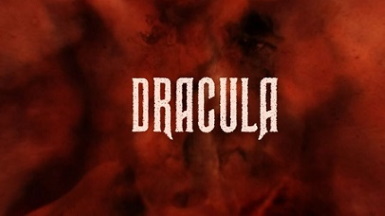Just to have some variation in the television shows, I though I might try this, a British adaptation of Dracula that was advertised as being made by the creators of Sherlock. The showrunners being of course Mark Gatiss and Steven Moffat, this uses the British format of only three episodes but each one being about an hour and half long. The first episode seemed promising, adhering to the source material quite closely with some important and interesting variations including making Van Helsing a nun named Agatha. However it goes off the rails very quickly after that with the intent obviously being to be as different as possible from its inspiration. This is to its detriment in my opinion.
A severely disfigured Jonathan Harker is recuperating in a convent in Hungary. He recounts his adventures to a nun, Agatha Van Helsing who claims to be something of an expert in the occult. Harker explains how he travelled from England to Transylvania to assist Count Dracula with the purchase of a property. He expected to stay only a short time, being eager to return to his fiancée, but Dracula is increasingly insistent that he stays in order to teach him English and the customs of the English. Dracula is of course drinking his blood every year, revitalizing himself while Harker grows weaker. Eventually he realizes that he is a prisoner and tries to find a way out but the castle is a labyrinth with seemingly no exits. Agatha ever more insistently asks him to explain how he eventually escaped and Harker finds that his mind has been compromised and his memories uncertain. Soon enough Dracula arrives at this very convent to confront Van Helsing, needing only an invitation to get inside. Van Helsing is confident of her defenses but Dracula is equally confident of the fallibility of mortals.
Once past the introductory period that hews quite closely to the source material, the show settles on a formula that is recognizable. First, swap out the familiar characters with gender-swapped versions and add new ones that are more diverse. That’s actually a good thing, allowing the exploration of versions of characters that are tweaked in novel ways and letting in more perspectives. On board the Demeter for example there is an Indian doctor who has prior experience with vampires. Next, change things up as much as possible in order to surprise the audience and ensure that the show is a fresh experience for everyone. This doesn’t work too well. In the novel, Dracula doesn’t assault a convent like he does here and it doesn’t even make for an interesting fight as he just walks over everyone. The second episode is set entirely on the Demeter as the passengers and crew try to deal with a murderer on board. The third episode has Dracula arriving in England but with a very surprising twist that I won’t spoil here. It’s true that this leads the story in directions no one can predict but it’s also at the expense of any verisimilitude or sensible character development. In order to get the plot to go where the writers want, many, many characters behave in ways that are profoundly dumb.
I am led once again to reflect on the nature of the horror genre, which innately constraints the story in many ways. One important constraint is that no character can be allowed to actually fight Dracula effectively or it wouldn’t be horror any longer. As such Van Helsing’s confidence in her preparations are completely unfounded and her fellow nuns are massacred. It’s remarkable how she barely has any emotional reaction to all her sisters dying as a result of her confidence. Similarly the prior experience of the Indian Dr. Sharma avails him not at all. One interesting character this show introduces is an African gentleman who as a skeptic is prickly about being seen as superstitious. Naturally horror stories love to kill off such silly people fast. All that diversity avails not at all as their role merely amounts to being more victims for Dracula and they have no agency of their own. This show casts Dracula front and center as a protagonist who loves to grandstand. By the third episode, Dracula doesn’t even bother hiding the fact that he is a vampire as it seems no one can do anything to him anyway.
The many twists and nods to diversity are all shallow, each meant to serve only the next witty quip by Dracula or the next dramatic shot of him baring his fangs. There’s no real consistency in building up the world and no need to develop secondary characters beyond the needs of the immediate scene. It’s all Dracula all the time, trying to paint him as the same kind of psychologically interesting and charismatic monster that we’ve seen in other fiction, yet the writing here has no depth at all with the plot being juvenile. This means that while this show had a promising start to me, I did not like it at all by the end.
